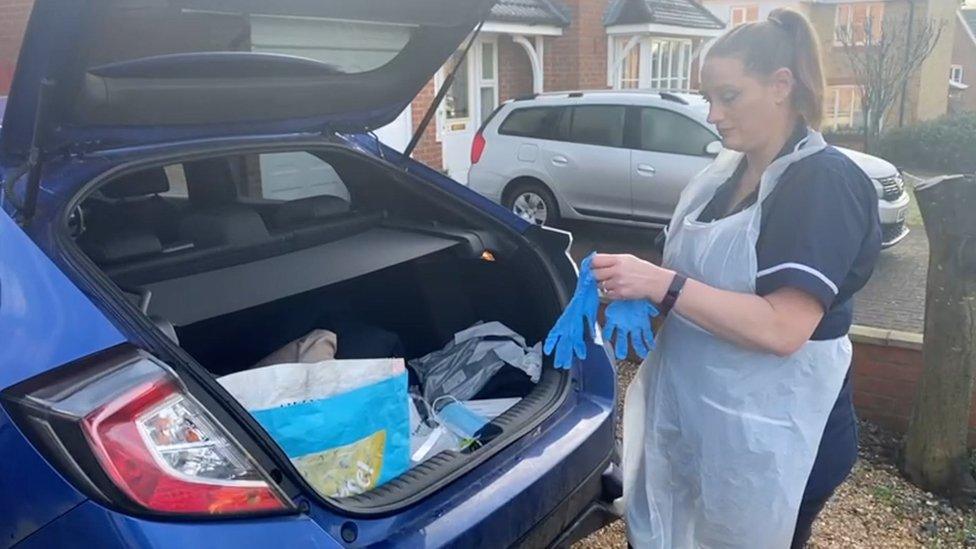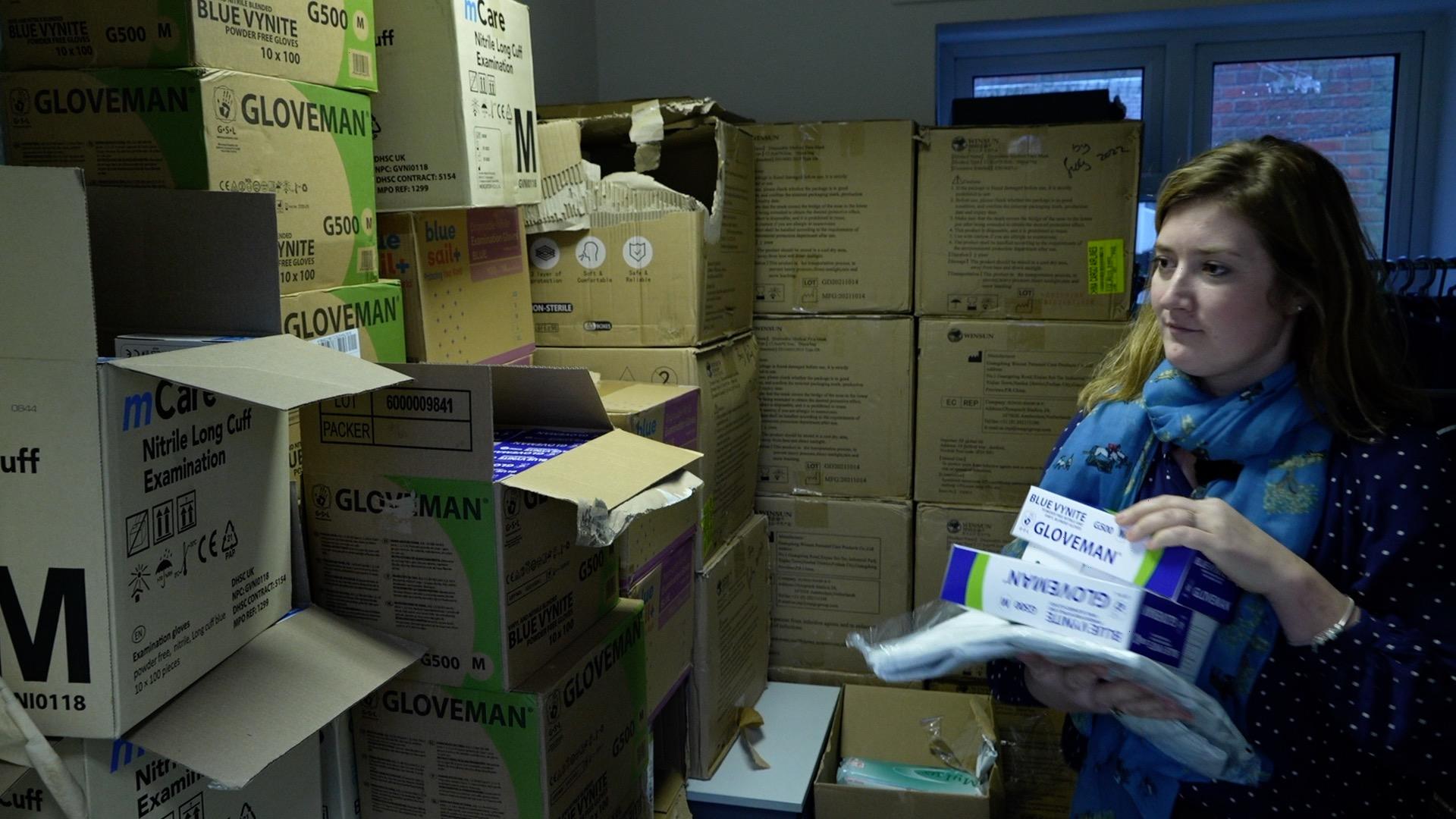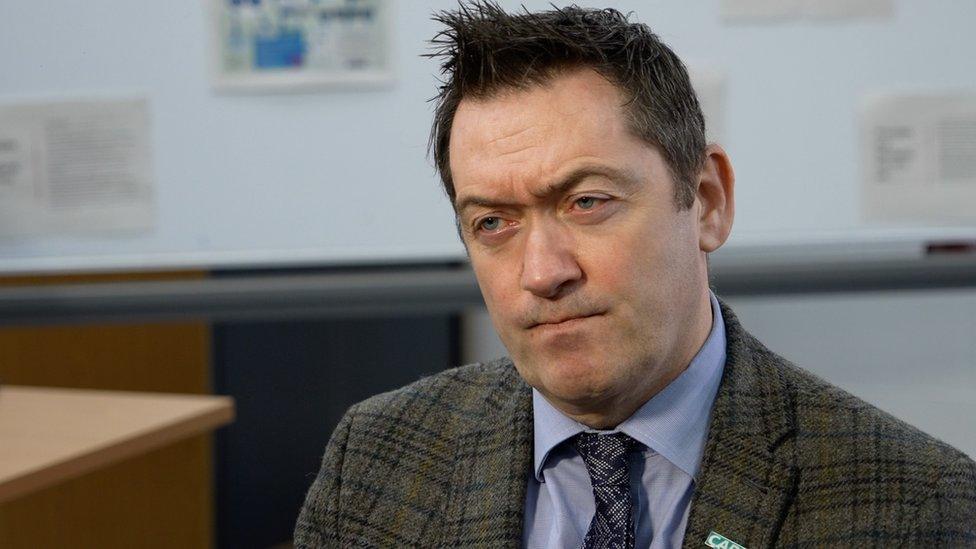Care services struggle with Omicron staff-sickness spike
- Published
- comments

Care providers say they are struggling to cope with so many staff off work with Omicron
The care system faces grim and relentless pressure compounded by Omicron, an organisation representing not-for-profit providers says.
The National Care Forum says existing staff shortages, absences caused by the Covid variant and delayed PCR results have left many services struggling.
The government says it has put significant additional money into social care.
But the National Care Forum says this amounts to "crumbs from the table".
"The continual drip-feed approach to funding, which, as a result of bureaucracy, fails to reach providers in a timely manner, is indicative of an approach that does not properly value the people who receive or deliver care," NCF chief executive Vic Rayner says.
"This must stop."
Managers running more than 5,000 care services, with nearly 100,000 staff caring for 130,000 people across the UK, responded to the organisation's January questionnaire.
Of these, two-thirds of those providing home care are no longer able to take new clients and nearly half of care homes have closed to new residents.
In Norfolk, Sarah Wyatt says her company, I Care Service, which provides homecare in the Dereham area, has closed its books to new clients and is using overtime and office staff to cover existing patients.
The pressure means many staff are burned out, she says.

Sarah Wyatt says staff shortages have caused her care company to close its books to new clients
This week, of 42 staff, four are isolating with Covid and another six are signed off for other reasons.
"Most of them are just tired," Ms Wyatt says.
"They've inputted so many hours, they're trying to juggle family lives as well as working - and that added pressure means they need to take a breather for a little bit."
She is looking at raising pay and has taken to social media to try to encourage local people to join the company as carers.
"We're constantly recruiting," she says.
"Our philosophy is the more staff that we've got, the more clients we can help."
'Enormously worried'
Norfolk County Council executive director of adult social services James Bullion says the Omicron variant, first identified in South Africa, has put the system under critical pressure for more than three weeks.
"Slowly but surely, care provision is silting up as a result of either higher levels of demand or higher levels of sickness," he says.
And this means the council has been unable to fully meet the care needs of 870 people.
Of these, about 200 are waiting for the council to put care in place before they can be discharged from local hospitals.
Sometimes families are able to step in and do some of the caring but this is far from ideal, Mr Bullion says.
"I'm enormously worried about those people in the community that have got their needs poorly met," he says.

"I've never seen pressure this big," Norfolk's director of adult social services, James Bullion, says
With the peak of Omicron in the area estimated to be two weeks away, Mr Bullion fears levels of staff sickness and unmet needs are likely to rise.
"I've never seen pressure this big," he says.
"We've never had a position where we've got 800 people whose needs we can't properly meet.
"The maximum in my career that's got to in the past has been about 100 - and that we thought was hugely bad.
"It's a really critical and risky moment for us."
Extra-long shifts
Across the UK, those who responded to the survey said staff vacancies were running at just under 20% before Omicron.
Now, in addition, about 14% of the staff they do have are off sick or self-isolating.
Staff and managers are working extra-long shifts to fill the gaps but the NCF wants more government support to help providers run safe, high-quality services.
Ms Rayner says: "It is unacceptable that, yet again, nearly two years on from the start of the pandemic, we continue to see enormous pressures in the care and support sector, this time compounded by the impact of Omicron."
In a statement, a Department for Health and Social Care official said: "Care staff are working incredibly hard, and to strengthen the workforce we have provided £462.5m for recruitment and retention, expanded the Health and Care Visa scheme, and are running our Made with Care recruitment campaign.
"Throughout the pandemic, we have made almost £2.4bn in specific funding available for adult social care as well as an extra £60m to keep people in care homes safe over January.''